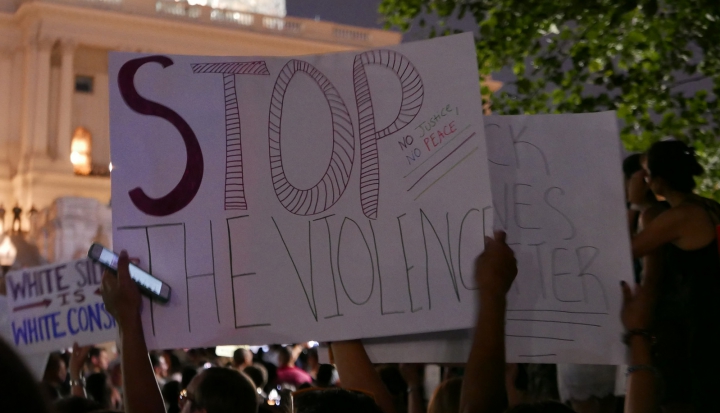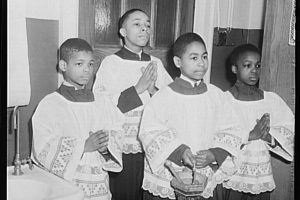Editors’ note: Last year, we at U.S. Catholic interviewed Tobias Winright about police militarization and his theological reflection on the violence and unrest in Ferguson, Missouri after the killing of Michael Brown. Winright, a former police officer, is now a Catholic theologian and ethicist who focuses on questions of force and violence. Unfortunately, his words are still equally as important and powerful today, especially in the immediate aftermath of the deaths of Alton Sterling, Philando Castile, and the police officers in Dallas.
Over the past three days cell phone cameras have shown us two more black men—Alton Sterling in Baton Rouge, Louisiana and Philando Castile in St Paul, Minnesota—bleeding and dying after being shot point-blank by police officers.
I do not know all the facts. All I know is what I have seen in these videos. But I don’t just see them through the eyes of a professor in an ivory tower, but through eyes that have seen both good and bad on the streets, in neighborhoods, in homes, and in a maximum security jail in my days as a correctional officer and a reserve police officer. Sadly, the good and bad are on both sides of the thin blue line between the police and the public. When I saw the many posts on Facebook following the killing of Castille, all I could write was this:
Words fail me, but here I go anyway. I am tired of fear, killing, racism, xenophobia, excuses, silence, hatred, lying, division, selfishness, sophomoric name-calling, idolatry—well, the list is too long, and as Pope Francis would say, it’s all connected. I am writing this only because some of you expect me to say something, given my professional background and publications on the subject. But I’ve said it many times before, and I’m worn out. Enough is enough. Maybe later, but right now I just feel a lot of shame and am really trying not to despair. I am worried about my daughters’ future if the way things are continues, because it’s not the way things ought to be. U2’s rendition of Psalm 40, “How long?” is all that I can think of.
During my daily run yesterday, I saw a black mother pushing a carriage with a baby in it, and a black father holding hands with his 2- or 3-year-old son. She smiled at me every time I passed them as I ran the six laps around the park, and I felt worse each time. Finally I stopped and said, “Your lives matter. As a former law enforcement officer and now as a theologian, I feel sorrow and shame.”
The man replied, “Thank you. I appreciate that.” But as I ran off, I only wished that I had added the word indignation at the end. Lament is necessary, but insufficient right now.
Later, after last night’s shootings of police officers in Dallas, I felt even closer to losing hope. Then I remembered that during each lap of that same run, I watched a police officer pulling over speeding vehicles in this neighborhood where my and other children ride their scooters and bicycles—exactly where, on several different occasions, a driver almost hit me during my run.
I appreciate police officers’ service, protecting us, for example, from careless drivers. And it is truly a dangerous job that gets little thanks. Few people understand what it’s really like, but I used to be on the other side of that blue line. And so I usually wave to police officers, and I am always willing to assist one who looks like he or she could use some help.
We Catholics say “Peace be with you” several times during Mass. We are baptized to be people of the Prince of Peace and commissioned to “Go in peace to love and serve the Lord.” As Pope Paul VI said, though, if we want peace, we must work for justice. And Pope Francis rightly emphasizes how mercy should characterize and channel our efforts to promote a just peace for all.
I encourage my fellow Catholics to do some prayerful self-reflection and to take steps toward building such a just peace by performing spiritual and corporal works of mercy in our parishes, neighborhoods, and communities during the rest of this year of mercy.
I also urge American Catholics to read as much as possible, as soon as possible, what they can about the history of slavery, African Americans, racism, and white privilege—as well as about policing. Some accessible books I recommend include:
- Michelle Alexander, The New Jim Crow: Mass Incarceration in the Age of Colorblindness (The New Press, 2012).
- Radley Balko, Rise of the Warrior Cop: The Militarization of America’s Police Forces (PublicAffairs, 2014).
- James F. Keenan, S.J., The Works of Mercy: The Heart of Catholicism (Rowman & Littlefield, 2005).
- John Kleinig, The Ethics of Policing (Cambridge University Press, 1996).
- Bryan Massingale, Racial Justice and the Catholic Church (Orbis Books, 2010).
- Samuel Walker, Popular Justice: A History of American Criminal Justice (Oxford University Press, 1997).
Image: Flickr cc via Susan Melkisethian













Add comment